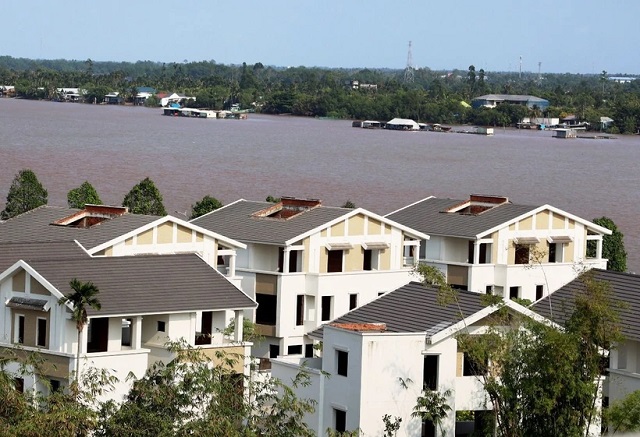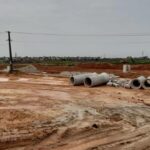
A riverside villa complex in My Tho city, Tien Giang province. (Photo: Hong Dat/VNA)
|
Despite being consulted, supplemented, and reviewed, there remain several inconsistencies between the three new laws related to land issues and the Law on Credit Institutions, causing difficulties for the banking sector.
This information was shared by several banks at a conference titled “The Impact of New Regulations in the 2024 Land Law, 2023 Housing Law, and 2023 Real Estate Business Law on Banking Activities,” organized by the Vietnam Banks Association (VNBA) in Ho Chi Minh City on November 29.
According to Mr. Nguyen Quoc Hung, Vice Chairman and General Secretary of the Vietnam Banks Association, during the law-making process, the VNBA participated in providing feedback and conveying the opinions of member organizations and experts to the drafting agencies.
Many proposed contents were accepted and incorporated into the current laws; however, some issues were not addressed.
Since the laws took effect in August 2024, credit institutions have encountered numerous difficulties and obstacles in their implementation.
The VNBA representative said that the association had received hundreds of opinions from credit institutions regarding obstacles in implementing the three laws. They proposed that the law-making agencies consider providing guidance and clarification to address these issues to ensure the safe and efficient operation of the banking system in the future.
This was also the reason why the VNBA coordinated with the Ministry of Construction and the Ministry of Natural Resources and Environment to organize this conference, which was held simultaneously in multiple provinces and cities.
Consolidating the opinions of credit institutions, Ms. Nguyen Thi Phuong, Vice Head of the VNBA’s Banking Law Club, provided specific information about the obstacles encountered during the implementation of these laws within the framework of banking activities.
Regarding the 2024 Land Law, Ms. Phuong said that the regulations do not clearly define the handling procedure for land revocation when it is used as collateral.
Specifically, neither the Law nor its guiding documents provide instructions on how to handle the situation when the State revokes the land that is currently legally mortgaged to credit institutions. At the time of accepting the mortgage, the credit institutions complied with the provisions of the law.
The State’s revocation of land that is mortgaged to credit institutions without any regulations on principles or mechanisms to ensure, support, or handle these cases will directly affect the rights and legitimate interests of credit institutions, debt recovery ability, and business efficiency. It also creates uncertainty for credit institutions when accepting mortgages of land use rights, especially for land use rights in projects.
In addition, the provision that allows local authorities to adjust land prices has led to some localities still using the current price frame while others have updated their prices according to the new regulations. The adjustment of land prices among localities is uneven, creating a lack of synchronization and inconsistency in land prices, causing difficulties and obstacles in land management and related transactions.

Illustrative image. (Photo: Tuan Anh/VNA)
|
Credit institutions also face obstacles related to the rights and obligations of land users, cases where land use rights cannot be transferred or donated, the duration of agricultural land use, and some difficulties in applying the 2024 Land Law in the process of organizing enforcement…
Especially in the context of rising non-performing loans in credit institutions recently, the 2023 Land Law’s provisions do not support the industry in dealing with bad debts secured by assets.
According to Mr. Do Giang Nam, Member of the Members’ Council of VAMC, all three laws directly affect banking activities in general and bad debt handling in particular.
For example, the 2024 Land Law does not regulate the mortgage of land lease rights in land lease contracts with annual payments, making it challenging for the parties involved when they want to mortgage their land lease rights to credit institutions.
Therefore, VAMC recommends providing specific guidance on this issue, including mortgaging/accepting mortgages of land lease rights in land lease contracts, the agency for registering secured transactions, the secured transaction registration dossier, etc.
Regarding the Housing Law, credit institutions are facing some obstacles related to capital mobilization conditions for real estate projects, collateral being separate houses constructed with a building permit but not yet updated on the Land Use Right Certificate, the purpose of mortgaging a part or the whole of the project or houses constructed within the project, conditions for mortgaging a part/whole of the project requiring a land allocation decision…
As for the Real Estate Business Law, credit institutions encounter difficulties with the transfer of contracts for the sale of construction works formed in the future, guarantees in the sale of houses formed in the future, the transfer of contracts for the sale of existing houses/transfer of contracts for the sale of construction works formed in the future, mortgage release before the sale of houses formed in the future, the transfer of existing houses in projects when the certificates have not been separated…
H.Chung
The Uncompensated Land Revocation for Transgressions in Land Regulations
Under the Land Law 2024, individuals or organizations utilizing land in violation of land laws are subject to land revocation.
The Overgrown Haven: A Tale of Abandonment in Hà Đông’s New Residential Project
The New Residential Area and Service Land Project in Van Phuc Ward, Ha Dong District, Hanoi, has become an eyesore due to its abandoned state. The once-promising infrastructure investment is now riddled with overgrown vegetation, littered with construction waste, and home to unauthorized construction material yards, much to the dismay of the local residents.
“A More Realistic Land Price Index Could Boost Land and Property Sales and Rental Prices”
“This is the opinion of Dr. Can Van Luc, BIDV’s Chief Economist, on land valuation based on market principles at the Sustainable Real Estate Market Development Forum held on the morning of November 27th.”
The Year-End Real Estate Market: A Resurgence to Remember, Ushering in a New Era of Growth
Mr. Hoang Hai, Director of the Department of Housing and Real Estate Market Management under the Ministry of Construction, observed that towards the end of the year, the real estate market demonstrated a positive recovery and embarked on a new cycle characterized by enhanced safety, improved health, and increased sustainability.





















